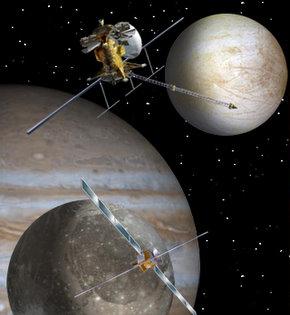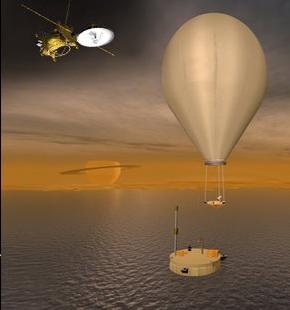The next mission to Jupiter is expected to leave in 2020 and reach Jupiter six years later when NASA and the European Space Agency will share the construction of the spacecraft, which will include orbiters for some of the moons, as well as a lander and a balloon that will tour Titan * At the same time, the two agencies are promoting a new mission to Saturn

In a meeting held last week between senior representatives of NASA and the European Space Agency, the two agencies narrowed down the options for the next flagship missions to the planets that will be joint missions between the US and Europe.
A mission to Jupiter and its four large moons will be the main big mission that the two agencies will focus on, while they continue to prepare for another potential mission - to visit Saturn's largest moons, Titan and Enceladus. The two missions - the one to Jupiter and the other to Saturn's moons are the result of the merger between the different mission concepts of NASA and the European Space Agency.
"This joint effort will represent a new challenge for space exploration and will be a milestone in the planetary sciences of the 21st century," said David Southwood, director of science programs and robotic missions at the European Space Agency. "What I am particularly sure of is that the cooperation across the Atlantic Ocean that we have had so far, and that we also anticipate for the future between America and Europe, between the agencies and between the scientific communities, is the right way. Let's get to work."
The mission to Europa and the Jupiter system will include two robotic orbiters that will be able to perform detailed studies of the gas giant and its moons Io, Europa, Ganymede and Callisto. NASA will build one orbiter, which is currently named Jupiter-Europa, and the European Space Agency will build the second orbiter, currently known as Jupiter-Ganymede. The spacecraft will be launched in 2020 from two separate launchers and separate launch sites. The spacecraft will reach the Jupiter system in 2026 and will spend at least three years conducting research.

Europa's moon has an icy surface and scientists speculate that it may contain an ocean of water beneath the ice sheet that could be home to life. Ganymede, the largest moon in the solar system is the only moon known to have an internally driven magnetic field and also has what scientists suspect is a subsurface ocean of water. Scientists have long sought to understand the reasons for the existence of the magnetic field. Callisto's surface is scarred with ancient craters, which will allow a glimpse into the record of events from the early days of the solar system.
"The decision means a WIN WIN situation for all partners," said Ed Weiler, NASA Assistant Administrator for the Science Mission Directorate at NASA Headquarters in Washington. "Although the mission to the Jupiter system has been selected to advance to the early flight opportunity, the mission to Saturn still remains a high priority for the scientific community."
The planned Titan mission will include a NASA rover as well as a lander and a balloon that will orbit Saturn's large moon, made by the European Space Agency.
Both proposals will enable another step in planetary science research. The flagship missions to the outer planets could eventually answer questions about the creation of the solar system and whether life exists elsewhere in the universe.
According to a report in Universe Today (the source is from NASA)

5 תגובות
to me:
I don't know if what the normal wars are doing can be called mission success.
After all, they divert us (because of our stupidity) from the important wars and all their beneficial results are nothing but by-products of the war effort.
If we were engaged in the real wars, we would enjoy both the by-products and the main product.
It is clear to me that all of this is utopian, but I think that from time to time it must be said because otherwise it will surely not happen.
That's why Einstein talked about world government and that's why the Beetles composed the song Imagine
The idea that if we call dealing with problems such as diseases, ecology, etc. "wars", then they will really trap us, as is currently the case mainly with real wars, is to a certain extent utopian. It can be hoped that this is indeed the case, and then when humanity finally matures it might be better.
In any case, it seems to me that at the moment only real wars succeed in the task, and even that only on the condition that one of the parties feels that he has won.
A. Ben-Ner:
Your words are true only as long as humans don't realize that they have many, many wars to wage against the things that threaten them all together.
Wars may trap those on one side of the fence but they separate them from those on the other side.
If we know how to choose the wars in which we are all on the same side - both the unification will be greater and our chances of survival will increase.
There is no shortage of "enemies" to fight one after the other and in fact, these wars that we neglect because we fight each other, are much more difficult.
Only think about the various diseases, the ecological problems, threats from space (including the eclipse of the sun).
Of course, nowadays - when many of us are only busy sharpening the dividing factors such as religions, countries, peoples, languages, etc. - we are losing the wars that are important to all of us.
to: "from a point"
Unfortunately, you are probably wrong.
Looking at the past, it seems that wars actually give a very significant boost to the advancement of science and technology, based on scientific knowledge.
In addition, wars make a very significant contribution to the cohesion and social and cultural consolidation of nations.
Without wars against an external enemy, a society can disintegrate and disintegrate due to internal conflicts.
Not so idyllic and romantic………unfortunately.
If instead of dealing with television religion and wars, they would have dealt with science, it would have been possible to do it already this year.